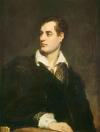XVIIMuch to be lov'd and hated, sought and fear'd.Opinion varying o'er his hidden lot,In praise or railing ne'er his name forgot;His silence form'd a theme for others' prate;They guess'd--they gaz'd--they fain would know his fate.What had he been? what was he, thus unknown,Who walk'd their world, his lineage only known?A hater of his kind? yet some would say,With them he could seem gay amidst the gay;But own'd that smile, if oft observ'd and near,Wan'd in its mirth and wither'd to a sneer;That smile might reach his lip but pass'd not by,None e'er could trace its laughter to his eye.Yet there was softness too in his regard,At times, a heart as not by nature hard,But once perceiv'd, his spirit seem'd to chideSuch weakness as unworthy of its pride,And steel'd itself, as scorning to redeemOne doubt from others' half withheld esteem;In self-inflicted penance of a breastWhich tenderness might once have wrung from rest;In vigilance of grief that would compelThe soul to hate for having lov'd too well.
XVIIIAs if the worst had fall'n which could befall,He stood a stranger in this breathing world,An erring spirit from another hurl'd;A thing of dark imaginings, that shap'dBy choice the perils he by chance escap'd;But 'scap'd in vain, for in their memory yetHis mind would half exult and half regret.With more capacity for love than earthBestows on most of mortal mould and birth,His early dreams of good outstripp'd the truth,And troubled manhood follow'd baffled youth;With thought of years in phantom chase misspent,And wasted powers for better purpose lent;And fiery passions that had pour'd their wrathIn hurried desolation o'er his path,And left the better feelings all at strifeIn wild reflection o'er his stormy life;But haughty still and loth himself to blame,He call'd on Nature's self to share the shame,And charg'd all faults upon the fleshly formShe gave to clog the soul and feast the worm;Till he at last confounded good and ill,And half mistook for fate the acts of will.Too high for common selfishness, he couldAt times resign his own for others' good,But not in pity, not because he ought,But in some strange perversity of thought,That sway'd him onward with a secret prideTo do what few or none would do beside;And this same impulse would, in tempting time,Mislead his spirit equally in crime;So much he soar'd beyond, or sunk beneath,The men with whom he felt condemn'd to breathe,And long'd by good or ill to separateHimself from all who shared his mortal state.His mind abhorring this had fix'd her throneFar from the world, in regions of her own:Thus coldly passing all that pass'd below,His blood in temperate seeming now would flow:Ah! happier if it ne'er with guilt had glow'd,But ever in that icy smoothness flow'd!'T is true, with other men their path he walk'd,And like the rest in seeming did and talk'd,Nor outrag'd Reason's rules by flaw nor start,His madness was not of the head, but heart;And rarely wander'd in his speech, or drewHis thoughts so forth as to offend the view.
XIXAnd seeming gladness to remain unseen,He had (if 't were not nature's boon) an artOf fixing memory on another's heart.It was not love perchance, nor hate, nor aughtThat words can image to express the thought;But they who saw him did not see in vain,And once beheld, would ask of him again.






